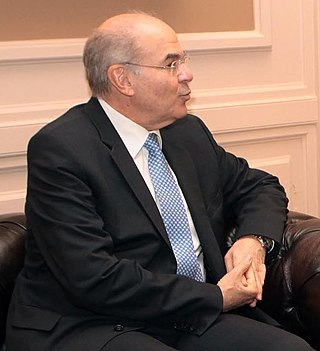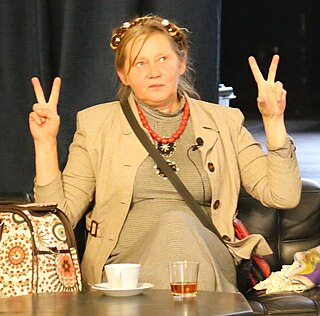Politics in Estonia takes place in a framework of a parliamentary representative democratic republic, whereby the Prime Minister of Estonia is the head of government, and of a multi-party system. Legislative power is vested in the Estonian parliament. Executive power is exercised by the government, which is led by the prime minister. The judiciary is independent of the executive and the legislature. Estonia is a member of the United Nations, the European Union, and NATO.

The European Court of Justice (ECJ), formally just the Court of Justice, is the supreme court of the European Union in matters of European Union law. As a part of the Court of Justice of the European Union, it is tasked with interpreting EU law and ensuring its uniform application across all EU member states under Article 263 of the Treaty of the Functioning of the European Union (TFEU).

Andrus Ansip is an Estonian politician, a member of the European Parliament, the former European Commissioner for Digital Single Market and Vice President of the European Commission, in office from 2014 until 2019. Previously, he was Prime Minister of Estonia from 2005 to 2014 and chairman of the liberal Estonian Reform Party from 2004 to 2014.

Lesbian, gay, bisexual, transgender, and queer (LGBTQ) rights in Estonia have advanced significantly over the course of the last few decades, especially since the turn of the 21st century. Among the countries which after World War II were controlled by the former Soviet Union, independent Estonia is now considered to be one of the most liberal when it comes to LGBTQ rights. There is a notable age gap, as younger people tend to be more tolerant and liberal, while older people tend to be more socially conservative.

Vassilios Skouris is a Greek judge who was President of the European Court of Justice from 2003 to 2015. A European legal scholar, he served briefly in the government of Greece as Minister of the Interior in 1989 and again in 1996. He is professor at the Law School of the Aristotle University and at Bucerius Law School in Hamburg, Germany.
The Supreme Court of Estonia is the court of last resort in Estonia. It is both a court of cassation and a constitutional court. The courthouse is in Tartu.

Vaino Vahing was an Estonian writer, prosaist, psychiatrist and playwright. Starting from 1973, he was a member of the Estonian Writers Union.
Juliane Kokott is the German Advocate General at the Court of Justice of the European Union (CJEU) and Professor at the University of St. Gallen.

Estonia, officially the Republic of Estonia, is a country by the Baltic Sea in Northern Europe. It is bordered to the north by the Gulf of Finland across from Finland, to the west by the sea across from Sweden, to the south by Latvia, and to the east by Lake Peipus and Russia. The territory of Estonia consists of the mainland, the larger islands of Saaremaa and Hiiumaa, and over 2,300 other islands and islets on the east coast of the Baltic Sea, covering a total area of 45,335 square kilometres (17,504 sq mi). Tallinn and Tartu are the two largest urban areas. The Estonian language is the official language and the first language of the majority of the population of 1.4 million.

Pauliine Koskelo was appointed President of the Supreme Court of Finland in 2005. On 21 April 2015 she was elected as a judge to the European Court of Human Rights by the Parliamentary Assembly of the Council of Europe.

Anastassia Kovalenko-Kõlvart is an Estonian motorcycle road racer and politician. She is racing in European Junior Cup and is first female racer in Estonian road racing history to race on the international level. She currently holds the title of the best female motorcycle athlete of the year in Estonia. She has been a member of Tallinn city council and is a member of Riigikogu for the Estonian Centre Party since 2022.

Jaak Madison is an Estonian politician and a member the European Parliament, where he is a member of the Committee on Foreign Affairs and the Committee on International Trade. He was member and deputy chairman of the Conservative People's Party of Estonia until leaving the party in June 2024 and joining Estonian Centre Party.

Indrek Saar is an Estonian actor and politician. He has been the leader of the Social Democratic Party from 2019 to 2022 and the Minister of Culture of Estonia from 2015 to 2019.

Maimu Berg is an Estonian writer, critic, translator, and journalist. She was a member of the Riigikogu, elected in 2011.

Kersti Kaljulaid is an Estonian politician who served as the fifth president of Estonia between 2016 and 2021, and was its first and only female head of state since the country declared independence in 1918. She was also the youngest president, aged 46 at the time of her election.

Merle Jääger is an Estonian television, stage and film actress, poet and author who frequently uses the pen name Merca. Initially associated with the burgeoning Estonian punk rock scene of the early to mid 1980s, she has been described as the "bard of protest". Her career as an actress began in her early 20s and she has received a number of high-profile awards for stage roles.

Jüri Adams is an Estonian politician. He formerly was the Justice Minister of Estonia from 1994 to 1995. He has been a member of numerous political parties, including the Estonian National Independence Party, Pro Patria Union, and later the Pro Patria and Res Publica Union. From 2014 to 2019, he was a member of the Estonian Free Party and a member of the Riigikogu.

Jüri Rätsep was an Estonian lawyer, politician and judge.
Anja Seibert-Fohr is a German jurist who serves as a judge at the European Court of Human Rights.

Sirje Helme is an Estonian art historian and art critic.

















